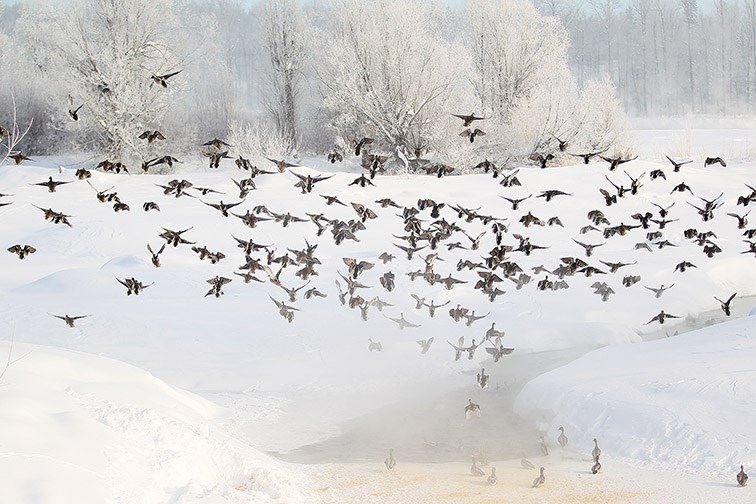Nobody's really sure why, but there are hundreds of ducks that decided that staying in Prince George was a good idea, rather than flying south for the winter.
Brock Bailey, longtime member of Ducks Unlimited, knew the ducks were in trouble when they started falling from the sky onto First Avenue a few years back. People would bring the emaciated bodies to him to see what he could see, being a retired conservation officer and all.
"When I picked them up there was nothing to the ducks," Bailey explained. "When winter came they would hang around and they would try to feed off the grain on the railroad tracks that would fall off the grain cars but it wasn't enough to sustain them. When this kind of weather hits, there's nothing for them between here and Vancouver. They don't have the energy or the muscle mass to fly anywhere so they're stuck here."
The mallards started wintering in Prince George en masse.
"So Paul and I try to eek 'em through the coldest part of the weather," Bailey said.
Paul Cailleaux, chapter chair, Prince George Sporting Clays, Ducks Unlimited Canada, has a theory.
"I think the birds have been fooled by the climate change," Cailleaux said.
He and Bailey have been feeding between 300 and 400 ducks since the cold set in and he doesn't expect there to be an end to it until the spring thaw happens in April or May.
"We're committed to it now," Bailey said with a smile and a shrug.
"Once the birds get stuck here they just try to survive the extreme cold," said Cailleaux.
The majority of the ducks are mallards, with two wood ducks and a few golden eyes that round out the flock, Cailleaux added.
Once Bailey takes two five gallon buckets of food down to the frozen part of the river, just where the open water begins at the park, and then retreats, the ducks flock to the feed.
There is, of course, a literal pecking order. The mallard males eat first, running off the weaker birds. Some ducks come to roost on a small hill overlooking the open water. They snuggle in, foraging for food that was once there, and now covered with several feet of snow and waiting their turn.
Cailleaux stays on the bridge near the parking lot and spreads his five gallon pail of food onto the frozen river below.
"You get to see a lot of nature here," Cailleaux said. "When there's open water here (indicating just under the bridge) the ducks gathered one day and a coyote came round to see if he could get to the ducks. The ducks knew they were safe, as long as they stayed in the water. It's very interesting to watch what happens."
Cailleaux and Bailey, who volunteer their time for this effort, have gotten donations of food for the ducks, but at times, they've had to purchase it, too.
"If any feed stores would donate food for the ducks, it surely would be appreciated," Bailey said.
To donate call Paul at 250-613-5324.



